SsangYong Rexton vs VW Tiguan - Differences and prices compared
Compare performance (202 HP vs 272 HP), boot space and price (41100 £ vs 33300 £ ) at a glance. Find out which car is the better choice for you – SsangYong Rexton or VW Tiguan?
Costs and Efficiency:
Price and efficiency are often the first things buyers look at. Here it becomes clear which model has the long-term edge – whether at the pump, the plug, or in purchase price.
VW Tiguan has a distinct advantage in terms of price – it starts at 33300 £ , while the SsangYong Rexton costs 41100 £ . That’s a price difference of around 7834 £.
Fuel consumption also shows a difference: VW Tiguan manages with 1.40 L and is therefore significantly more efficient than the SsangYong Rexton with 8.20 L. The difference is about 6.80 L per 100 km.
Engine and Performance:
Power, torque and acceleration are the classic benchmarks for car enthusiasts – and here, some clear differences start to show.
When it comes to engine power, the VW Tiguan has a distinct edge – offering 272 HP compared to 202 HP. That’s roughly 70 HP more horsepower.
In acceleration from 0 to 100 km/h, the VW Tiguan is convincingly quicker – completing the sprint in 5.90 s, while the SsangYong Rexton takes 10.60 s. That’s about 4.70 s faster.
In terms of top speed, the VW Tiguan performs clearly perceptible better – reaching 242 km/h, while the SsangYong Rexton tops out at 184 km/h. The difference is around 58 km/h.
There’s also a difference in torque: SsangYong Rexton pulls minimal stronger with 441 Nm compared to 400 Nm. That’s about 41 Nm difference.
Space and Everyday Use:
Whether family car or daily driver – which one offers more room, flexibility and comfort?
Seats: SsangYong Rexton offers evident more seating capacity – 7 vs 5.
In curb weight, VW Tiguan is noticeable lighter – 1599 kg compared to 2145 kg. The difference is around 546 kg.
In terms of boot space, the SsangYong Rexton offers slightly more room – 784 L compared to 652 L. That’s a difference of about 132 L.
In maximum load capacity, the SsangYong Rexton performs slightly better – up to 1977 L, which is about 327 L more than the VW Tiguan.
When it comes to payload, SsangYong Rexton distinct takes the win – 770 kg compared to 533 kg. That’s a difference of about 237 kg.
Who wins the race?
The VW Tiguan proves to be wins the duel decisively and therefore becomes our DriveDuel Champion!
VW Tiguan is the better all-rounder in this comparison.

VW Tiguan
Costs and Consumption
View detailed analysis
Engine and Performance
View detailed analysis
Dimensions and Body
View detailed analysis
SsangYong Rexton
The SsangYong Rexton is a no-nonsense full-size SUV that pairs rugged, go-anywhere bones with a surprisingly plush cabin, making it an appealing choice for buyers who want capability without premium-brand prices. It won’t turn heads like a luxury badge, but its generous space, sensible features and honest practicality make it a smart, down-to-earth family hauler — a savvy pick if you value substance over status.
details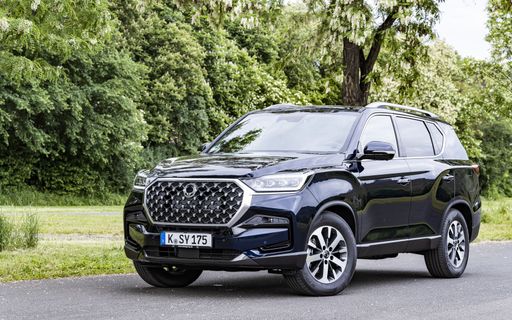
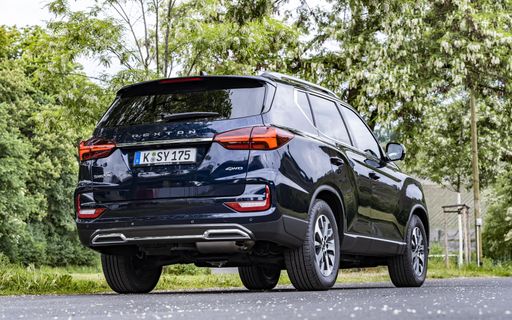
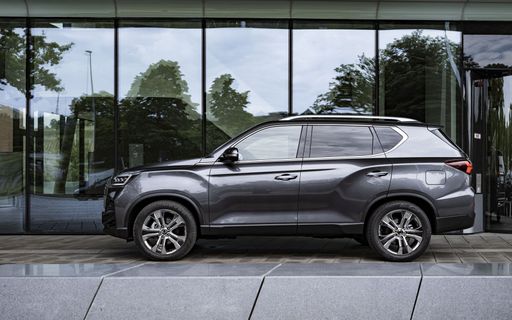
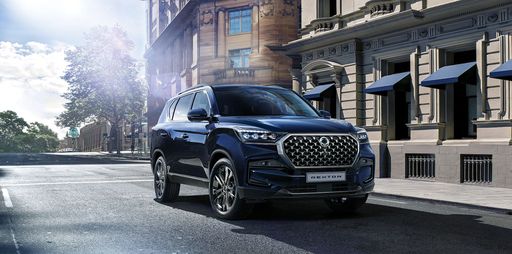
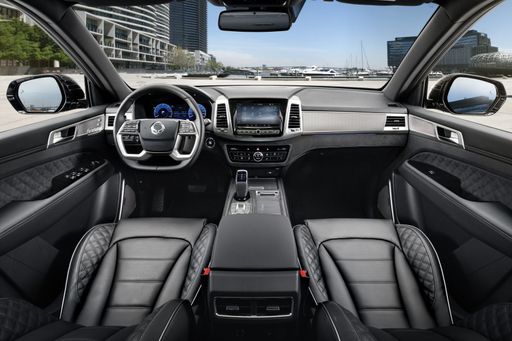
VW Tiguan
The VW Tiguan blends sensible family practicality with a dash of German polish, delivering a calm, reassuring ride and a cabin that never feels like an afterthought. For buyers who want an SUV that’s easy to live with yet still nicely dressed, the Tiguan is the grown‑up choice that keeps a cheeky wink in reserve.
details





Costs and Consumption |
|
|---|---|
|
Price
41100 - 51300 £
|
Price
33300 - 51900 £
|
|
Consumption L/100km
8.20 L
|
Consumption L/100km
1.4 - 8.4 L
|
|
Consumption kWh/100km
-
|
Consumption kWh/100km
-
|
|
Electric Range
-
|
Electric Range
118 - 126 km
|
|
Battery Capacity
-
|
Battery Capacity
19.70 kWh
|
|
co2
214 - 216 g/km
|
co2
32 - 190 g/km
|
|
Fuel tank capacity
70 L
|
Fuel tank capacity
45 - 58 L
|
Dimensions and Body |
|
|---|---|
|
Body Type
Off-Roader
|
Body Type
SUV
|
|
Seats
5 - 7
|
Seats
5
|
|
Doors
5
|
Doors
5
|
|
Curb weight
2145 - 2180 kg
|
Curb weight
1599 - 1890 kg
|
|
Trunk capacity
236 - 784 L
|
Trunk capacity
490 - 652 L
|
|
Length
4850 mm
|
Length
4539 mm
|
|
Width
1960 mm
|
Width
1842 - 1859 mm
|
|
Height
1825 mm
|
Height
1656 - 1658 mm
|
|
Max trunk capacity
1806 - 1977 L
|
Max trunk capacity
1486 - 1650 L
|
|
Payload
655 - 770 kg
|
Payload
460 - 533 kg
|
Engine and Performance |
|
|---|---|
|
Engine Type
Diesel
|
Engine Type
Petrol, Petrol MHEV, Diesel, Plugin Hybrid
|
|
Transmission
Automatic
|
Transmission
Automatic
|
|
Transmission Detail
Automatic Gearbox
|
Transmission Detail
Dual-Clutch Automatic
|
|
Drive Type
All-Wheel Drive
|
Drive Type
All-Wheel Drive, Front-Wheel Drive
|
|
Power HP
202 HP
|
Power HP
130 - 272 HP
|
|
Acceleration 0-100km/h
10.60 s
|
Acceleration 0-100km/h
5.9 - 10.6 s
|
|
Max Speed
184 km/h
|
Max Speed
210 - 242 km/h
|
|
Torque
441 Nm
|
Torque
220 - 400 Nm
|
|
Number of Cylinders
4
|
Number of Cylinders
4
|
|
Power kW
148 kW
|
Power kW
96 - 200 kW
|
|
Engine capacity
2157 cm3
|
Engine capacity
1498 - 1984 cm3
|
General |
|
|---|---|
|
Model Year
2021 - 2023
|
Model Year
2024 - 2025
|
|
CO2 Efficiency Class
G
|
CO2 Efficiency Class
G, D, E, F, B
|
|
Brand
SsangYong
|
Brand
VW
|
Is the SsangYong Rexton offered with different drivetrains?
The SsangYong Rexton is available as All-Wheel Drive.




